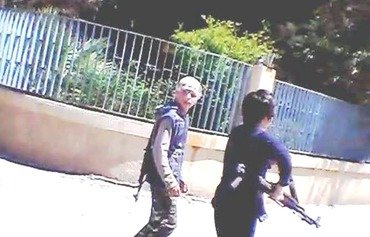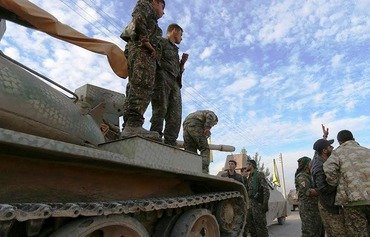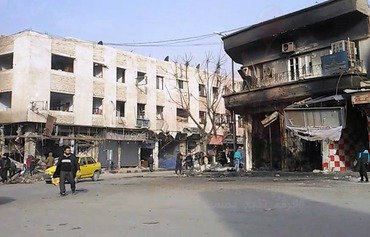An alarming increase in acrimony between its foreign and Arab fighters has prompted the "Islamic State of Iraq and the Levant" (ISIL) to establish an office tasked with preventing further friction and defections, an activist group says.
In an April 26th report, Al-Raqa is Being Slaughtered Silently revealed that ISIL has set up a "migrants office" overseen by both Syrian and foreign elements to follow up on these problems, curb defections and prevent internal clashes.
The office was established to prevent ISIL's security apparatus from meting out harsh punishments on the group's foreign fighters, who some Iraqi and Syrian elements suspect of collaborating with coalition forces, the report said.
Tensions escalate
Tensions between Arab and foreign fighters have been escalating since February, when ISIL executed eight Dutch fighters in Maadan, al-Raqa province, after accusing them of attempting desertion and mutiny.
This incident and the fallout from it is the main reason behind the establishment of the office, according to the report.
Several ISIL leaders also have been killed in coalition airstrikes, leading the group to point the finger at foreign fighters for providing them with intelligence.
The establishment of the "migrants office" shows ISIL's intense drive to avoid alienating its foreign fighters at a time when it is increasingly difficult for the group to recruit new members, said military analyst and retired Egyptian military officer Maj. Gen. Abdul-Karim Ahmed.
"With the passage of time, the unraveling began of the false facts promoted by ISIL about life in its alleged multinational 'Islamic state' that is portrayed by its media machine as the land of bliss where all live in harmony and love under the banner of religion," he told Al-Shorfa.
The truth, which the group has worked hard to conceal, is that its foreign fighters live in segregated groups, he said.
Myth of the 'caliphate' fades away
Life for ISIL fighters is quite different now than it was when the group first announced it was establishing a "caliphate", Ahmed said.
At that time, he said, foreign fighters flocked to Syria, as ISIL was flush with funds, controlled vast territories and had much to offer them, including salaries, homes and cars.
It was inevitable that discord would emerge with the imposition of a blockade on the group and its loss of territories, he said, as well as the significant decline in its finances after most of its local and global funding sources were eliminated.
The establishment of this office underscores "the clashes occurring between the sub-groups based on ethnicity or nationality", Ahmed added, as ISIL is unable to establish a real community where all nationalities live together in harmony.
The end is near for the group, and for its foreign elements in particular, he said, since they do not accept the authority of its Iraqi and Syrian leadership.
The group's leaders are known for their "harsh treatment and highly suspicious view of foreign elements as agents for intelligence services", he said.
Despite ISIL's establishment of a "migrants office", foreign fighters do not appear in the streets of al-Raqa as they used to, said Abdulkadir Yahya, a young entrepreneur from al-Raqa city who asked to use a pseudonym.
While they used to stroll through the markets alone or with their families, they now go out fully armed in groups of five or more, he told Al-Shorfa, adding that they seem anxious and closely monitor their surroundings.
They no longer spend much time shopping, he said, but rather head to specific stores, purchasing supplies for large numbers of people in quantities sufficient for several days.
Syrian and Iraqi ISIL elements often appear when a group of foreign fighters are in the market, he said, to spy on them and track their conversations with residents and with each other.
Foreign fighters fail to assimilate
It is extremely difficult to assimilate a group of people of different nationalities into one community in a short period of time, Cairo University psychology professor and family therapist Waliyyuddin Mukhtar told Al-Shorfa.
"ISIL imposes social rules based on its own view of religion and sharia, and most are incompatible with many [local] social customs," he said.
Many countries have opened their doors to immigrants, he added, but many immigrant groups stick together, setting up their own communities that are miniature models of their home countries.
ISIL does not want to see this happen in its own state, he said, so it has been forcefully imposing its customs and traditions on everyone.
It is possible for subgroups to keep up outward appearances to comply with the wishes of the emirs, he said, but the truth is that these groups will still set up their own communities and observe their own social rituals, albeit with an extremist bent.

![Foreign elements of the 'Islamic State of Iraq and the Levant' are pictured at a hospital. [Photo courtesy of Syrian media activist 'Abu Sham al-Raqa’]](/cnmi_am/images/2016/06/10/5541-Syria-foreign-fighters-600_384.jpg)






